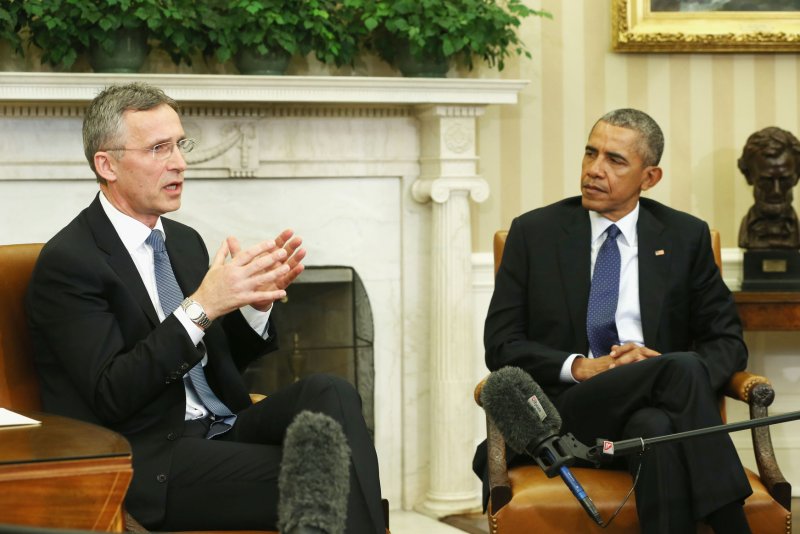President Barack Obama meets with NATO Secretary-General Jens Stoltenberg in the Oval Office at the White House on April 4, 2016, to discuss how NATO can assist in the fight against the Islamic State. Tuesday, Stoltenberg said NATO has designated cyberspace as an official frontier for warfare, making computer-related attacks eligible for an Article 5 defense response by the 28-member organization. Pool photo by Mark Wilson/UPI |
License Photo
BRUSSELS, June 14 (UPI) -- The North Atlantic Treaty Organization on Tuesday, for the first time, recognized cyberspace as a frontier for war -- in addition to the traditional sites of battle, like land and sea.
The declaration was made following a meeting of NATO's defense ministers Tuesday.
"Today, we met in the Nuclear Planning Group to consider the safety, security and effectiveness of NATO's nuclear deterrent. We also turned our attention to cyberspace," NATO Secretary-General Jens Stoltenberg said. "We agreed that we will recognize cyberspace as an operational domain. Just like air, sea and land."
Stoltenberg said it has become clear that dangerous attacks can be launched on the Internet and among computer networks just as easily as they can on the battlefield.
"Most crises and conflicts today have a cyber dimension," he added. "So treating cyber as an operational domain would enable us to better protect our missions and operations."
NATO and allies also agreed Tuesday to set up four reinforced battalions in the Baltics and Poland and examine a possible brigade in Romania to boost its presence.
The moves, which also include doubling the size of the organization's rapid response force, are being made amid what leaders view as an evolving landscape in Europe due to Russia's recent intervention in Ukraine.
Making cyberspace an official war zone means attacks carried out in that manner can trigger an Article 5 response, which is a collective action by the 28-member organization against the perpetrator of an incident aimed at any NATO-protected state. Before, only actions in traditional war frontiers -- land, sea or air -- had that potential.
The last time an Article 5 response happened was after the 9/11 terrorist attacks.
Cyber attacks have become more commonplace in recent years. The U.S. government has claimed multiple attacks over its computer networks from hackers in both Russia and China. The Islamic State terror group is also further developing its cyber attack capabilities, intelligence officials say.
It was reported Tuesday, for example, that Russian hackers were able to breach computer networks of the Democratic National Committee, reportedly to access information on Republican presidential candidate Donald Trump.
"The security of our system is critical to our operation and to the confidence of the campaigns and state parties we work with," DNC Chairwoman Debbie Wasserman Schultz said.















